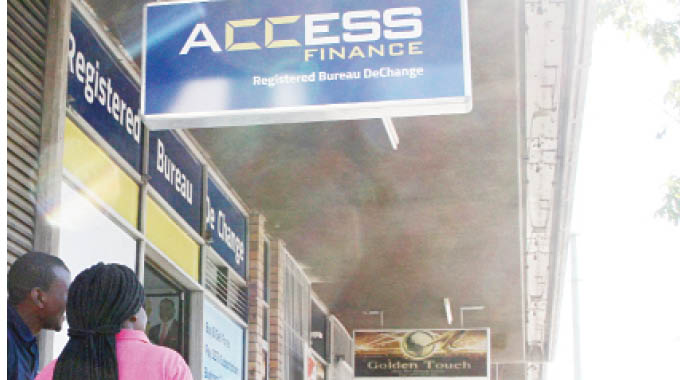EDITORIAL COMMENT: A good start for bureaux de change

The parallel foreign currency market is illegal but over the past 19 years of biting forex shortage, it assumed a status of legality with companies pegging their prices based on it and openly defending them. Some creatively named it the “alternative market”.
Businesses kept their ears, eyes, and runners on the street for regular updates on any movements in the rate and promptly increased their prices as soon as the local currency weakened against the US$ on that market.
Given that the rates on the black market fluctuate, not on the basis of any fundamentals but at the whim of the sharks who pulled the strings backstage, prices were extremely unstable; unstable in one direction which is up. Profiteers took advantage. As a result, most consumers, those who have no access to foreign currency, suffered a lot.
Yet a country’s economy cannot run on that basis.
In February, the Government responded by introducing the local currency, 10 years after it demonitised it and, in its place, put a basket of multiple foreign currencies. In June, the Government banned the use of foreign currencies in local transactions except in a few prescribed transactions. The restoration of the domestic currency meant that the Reserve Bank of Zimbabwe regained its function as the monetary authority in the country. This, among other implications, necessitated the return of bureaux de change 15 years after they were banned. To date, the RBZ has licensed 46 bureaux de change that are located across the country. The interbank market was also reinstated.
People with foreign currency are now bound to use banks or bureaux de change to change it into local currency to be able to use it to buy goods and services on the local market.
The performance of bureaux de change over the past five months has been encouraging in terms of harnessing foreign currency in a legal manner, bringing the necessary order on the currency market as well as squeezing life out of the black market.
With the exchange rate at some banks and bureaux de change slowly moving towards a convergence with that on the black market, people now see no reason why they should risk arrest and the possibility of being defrauded by black market traders. As a result they are selling their foreign currency at the formal platforms, as we reported in these pages in yesterday.
On Monday, newly opened financial services provider and bureaux de change, Access Finance (Pvt) Ltd, was offering ZWL$10,4 and ZWL$7,4 per US$ for electronic transfers and cash transactions respectively. Cash 24, run by Halsted Brothers, had similar rates. Yesterday Access Finance (Pvt) Ltd was offering ZWL$10,5 to US$ for electronic transfers, the same rate that was being offered on black market.
Mrs Nobukhosi Moyo told The Chronicle on Monday after being served at Access Finance that she was happy about the service and it was better than changing money on the streets.
“It is more discreet and safer. There is privacy and I have no fear that there could be someone following me. I used to change on the streets but the problem with that is you could never trust the person you are dealing with. Sometimes forex dealers connive with robbers and you can be robbed of your money soon after changing,” she said.
Street traders are feeling the pinch.
“It makes it difficult to operate because we have to offer deals that are just as competitive but it is unsustainable. Our major business now is selling cash. If someone wants bond notes in exchange for bank transfer or Zipit, we offer the deals at a premium. The average rate is 30 percent but it can go higher or lower depending on demand,” said an illegal foreign currency dealer only identified as Max.
Five months is not a long time to completely eradicate the illegal foreign currency market but that short period has given us what we believe are genuine clues to the future of currency trading in the country.
We urge authorities to open more and more bureaux de change across the country to assist smaller, walk-in holders of foreign currency wishing to convert it into local currency. At the same time, we urge authorities to continue strengthening the interbank market so that it becomes a viable source of hard currency for companies seeking money to finance imports.
This will bring sanity not only to the currency market in the country, but the entire domestic market too and with it the demise of the black market for money.








Comments